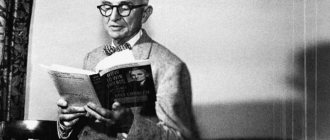The concept of “novelty effect” in psychology
Definition 1
The novelty effect is a phenomenon of social psychology that manifests itself in the perception of a person by a person - in relation to a familiar person, the most memorable is the last information received about her, while in relation to an unfamiliar person, the most significant is the first impression about her.
The area of social perception associated with the description of phenomena, effects, manifestations is the most studied, having rich factual material. Phenomena and effects are both original “errors” and important patterns associated with the characteristics of the psyche.
The effect of novelty makes life happier and more fulfilling. The novelty effect is closely related to the halo and primacy effect and manifests itself through the significance of information of a certain order about a person in order to form an idea about him. In relation to a familiar person, the latest, new information about him will be significant - this is the effect of novelty. Regarding a stranger, the first information about him will be significant - the primacy effect.
Too lazy to read?
Ask a question to the experts and get an answer within 15 minutes!
Ask a Question
Both effects are considered as special cases of the manifestation of the process, the perception of a person by a person - this process is called stereotyping.
Psychology explains these “mistakes” simply and clearly, but it is difficult to transfer these principles into practice.
Psychologists believe that previously acquired knowledge goes into long-term memory, while new knowledge acquired is still in short-term memory and consciousness does not perceive it as a reliable fact. The second reason for this effect, in their opinion, lies in the unconscious prioritization between those reporting information. It is usually believed that the first source, in obtaining any information, if it satisfies the individual’s needs, then it will be more attractive and there will be more trust in it.
The law of precedence, discovered by the American psychologist M. Lundt in 1925, coincides with the novelty effect - this concept existed before the official formulation of the novelty effect. This feature of perception in modern psychology is associated with the works of the Polish-American psychologist Solomon Asch.
Too lazy to read?
Ask a question to the experts and get an answer within 15 minutes!
Ask a Question
S. Asch in 1946 mentioned the primacy effect for the first time in his article. Analyzing his experiment, he put forward a theory - the first message about something makes a stronger impression on a person.
The primacy effect of S. Asch was criticized by K. Hovland, the founder of the Yale School, who believed that the theory does not consider the educational level of the audience, its worldview, and horizons.
The effect of novelty is opposed to the effect of primacy. It is defined as the tendency of an individual to reject previous information about a person, giving greater significance to new data.
To test these effects, N. Miller and D. Campbell conducted an experiment in 1959. The point of the experiment was what would happen to their view of the trial. They received a transcript of the trial with the arguments of the prosecution and defense collected in separate blocks. Their point of view about the guilt or innocence of the accused changed depending on which block they read first.
As a result, scientists concluded that the novelty effect defeats the primacy effect only if:
- a large amount of time passes between two messages with conflicting information;
- The audience should formulate its opinion immediately after receiving new information.
Switching
Switching is constantly changing trading strategies without any real reason for it. This usually happens either after a series of losing trades, or after the account equity changes to negative.
The most recent losing trades made are convincing enough to make a trader believe that his strategy is no longer viable, even though it is generally profitable.
When this happens, the trader changes strategy. When a similar drawdown occurs with a new strategy, he changes it again, and so on.
The trader believes that he is successfully avoiding a series of losing trades because he stops trading the strategy when it becomes unprofitable. In reality, systems do not have profitable periods, since each of them never completely goes through a drawdown and does not begin to make a profit; As a result, the presence of only losing series of trades affects the trading account.
If a strategy has been tested and there is evidence that it is a winner, then the right thing to do is to trade it during the drawdown period. However, poor trading results will be a recent event, and instead of following a logical plan, traders will try to avoid losing trades by switching from a winning system to another.
Forming a first impression of a person
A person’s daily life is full of new encounters, and in many circumstances it is necessary to evaluate people on the basis of short-term perception - these are first impressions and, on its basis, appropriate behavior arises.
The first impression is a complex psychological phenomenon, including logical, emotional, and sensory components. A first impression can be formed both with a special intention to evaluate a person, and in the absence of such an intention.
The determining factors in the impression of a person when meeting for the first time are the features of his appearance and behavior. The person himself, his behavior and appearance are reflected very clearly at the first meeting.
Also, the formation of an impression of a stranger is significantly influenced by the situation in which the meeting took place.
The impression will also depend on the personal qualities of the person who evaluates the stranger, his mental makeup and attitude towards various aspects of reality.
The listed factors are global and are closely interconnected.
Research conducted by psychologists suggests that when forming an opinion about the personality traits of a person you meet for the first time, his overall aesthetic expressiveness is of great importance. For example, the degree to which a person’s physical appearance corresponds to the established ideal of beauty.
Using the method of competent judges, A. Miller conducted an experiment, selecting from a large number of photographs beautiful faces from the point of view of judges and ordinary faces. Two groups of photographs were shown to women and men whose ages ranged from 18 to 24 years. The subjects' task was to tell from the photographs about each person's inner world.
The photographs in which the faces were classified as more beautiful were characterized by the subjects as confident, sincere, happy, spiritually rich people. The assessment of the second group of photographs had significant differences with the first group.
The studies performed show that physical attractiveness causes a “shift” in assessments when the object turns out to be a person’s personality traits and when a specific result of an activity or action is evaluated.
Bring back logical thinking with a trading journal
The novelty effect is when a trader makes trading decisions based on emotion rather than logic.
When the mind is under the influence of emotions, it is difficult to switch back to logical thinking.
Using a trading journal can help force the mind to think logically as a trading journal presents facts and data. Let's assume that a trader always records his trading activity; then, if he looks at the results of past transactions, he gets information from facts, not from emotions.
This data cannot be argued with, so reading previous results that demonstrate the profitability of the system will return the mind to thinking logically.
Getting ready for the exam!
Often the primacy effect occurs at those moments when we need to remember a large amount of information. Most often this happens before taking exams, when you have to read, write and study a lot. If your brain works exactly according to this pattern - it remembers all the very first things, then you can take advantage of it. Study the most important things first, and leave the less important ones for later. The second useful thing to learn from this type of thinking is the use of synonyms. You will perfectly remember the first ticket that you have learned, and when in the next ones you come across the same words or numbers that were in the first one, you will automatically remember this information.
But we draw your attention to the fact that if there is too much information, the primacy effect can be suppressed, and the only thing you can remember is the last phrases you learned.
For your own sake
We have long realized that others don’t care about us. They evaluate us only instantly, thinking for a second, and then forget. But we believe, although we know that this is not so, that they think day and night about how smart/fashionable/beautiful/rich/successful we are, etc. We try, as if for them, to become in the eyes of society better, but it turns out that we become better for ourselves. Let's give an example: at school you were the most unpopular person, you hung out with similar hermits, and were not part of noisy groups. But now you are already 30, and you have your own business and quite an interesting circle of friends. You are popular there, many influential people know you. When you come to an alumni meeting, you will most likely shock them and make them think differently about you. And most likely, you achieved your success only because you didn’t have it at school. Now you want to demonstrate to your classmates that you have become different, they see it and note it, but after the meeting they forget about you again. It turns out that for the sake of the effect of novelty, you have changed for the better.
Pleasure
That very feeling when you have experienced something new and are now wildly happy about it cannot be compared with anything. This applies to extreme sports, travel, and even stage performances. Well, sometimes a new pair of shoes gives you a feeling of unearthly happiness. But we are no less delighted by those things that were nice a long time ago, and now for some reason forgotten. We remember, repeat and become happier again. It is precisely in such cases that the effect of novelty and primacy in psychology go hand in hand. When you discover something fundamentally new, you enjoy it as it is your first time. And remembering past pleasures, you are given that very effect of primacy, also causing positive emotions in yourself.
Method of application
Such a phenomenon as the novelty effect is inherent to all people to one degree or another. Perhaps only grumpy old people can rely solely on initial impressions, and then, most likely, they will do it out of spite, deep down understanding what has changed and accepting it. For this effect to work in your favor, you need to learn how to correctly implement it into your life. This can be done in all areas, the main thing is to catch the “wave” and feel how you yourself and your society react to changes. Let's look at exactly which areas this phenomenon can take root.











